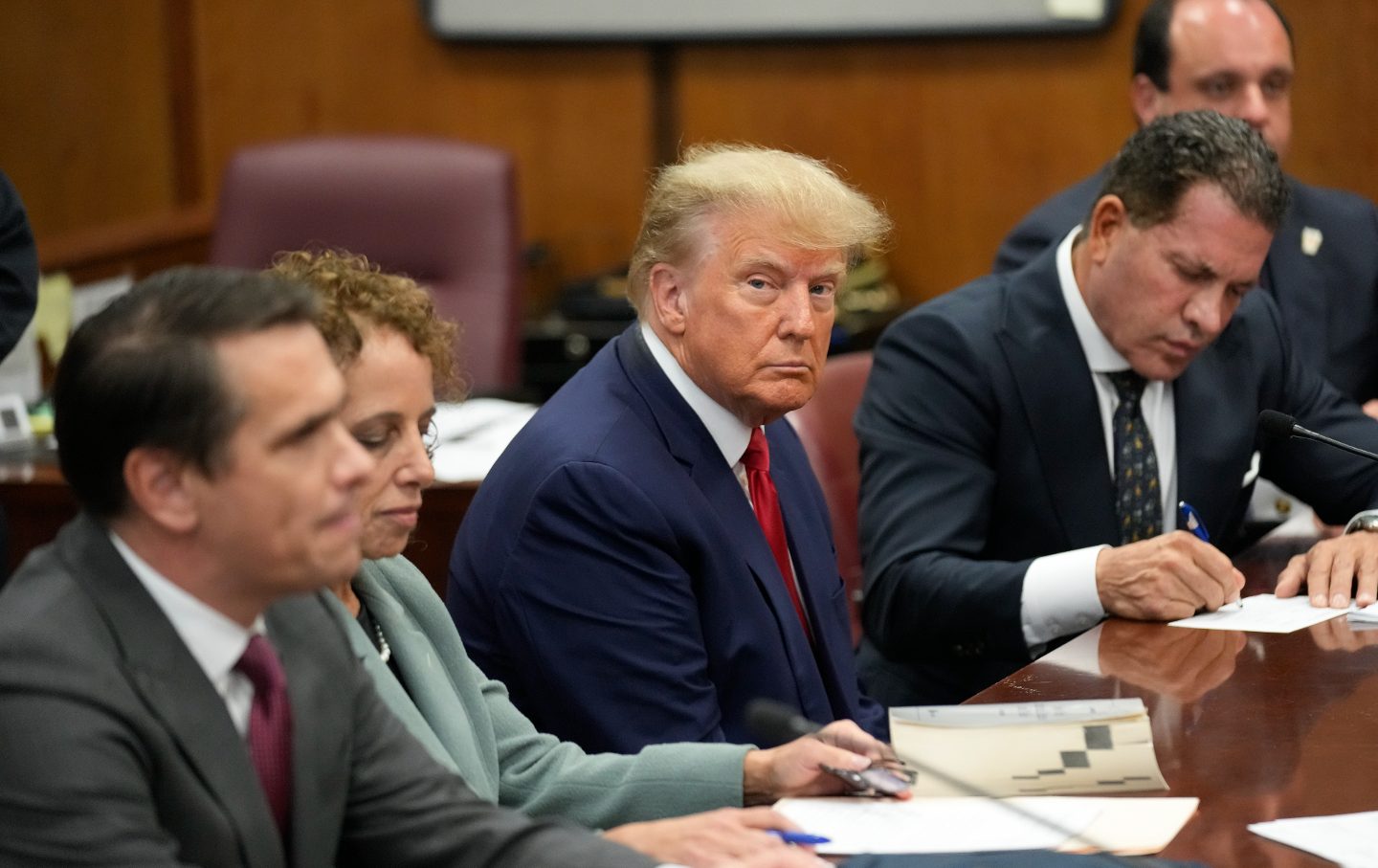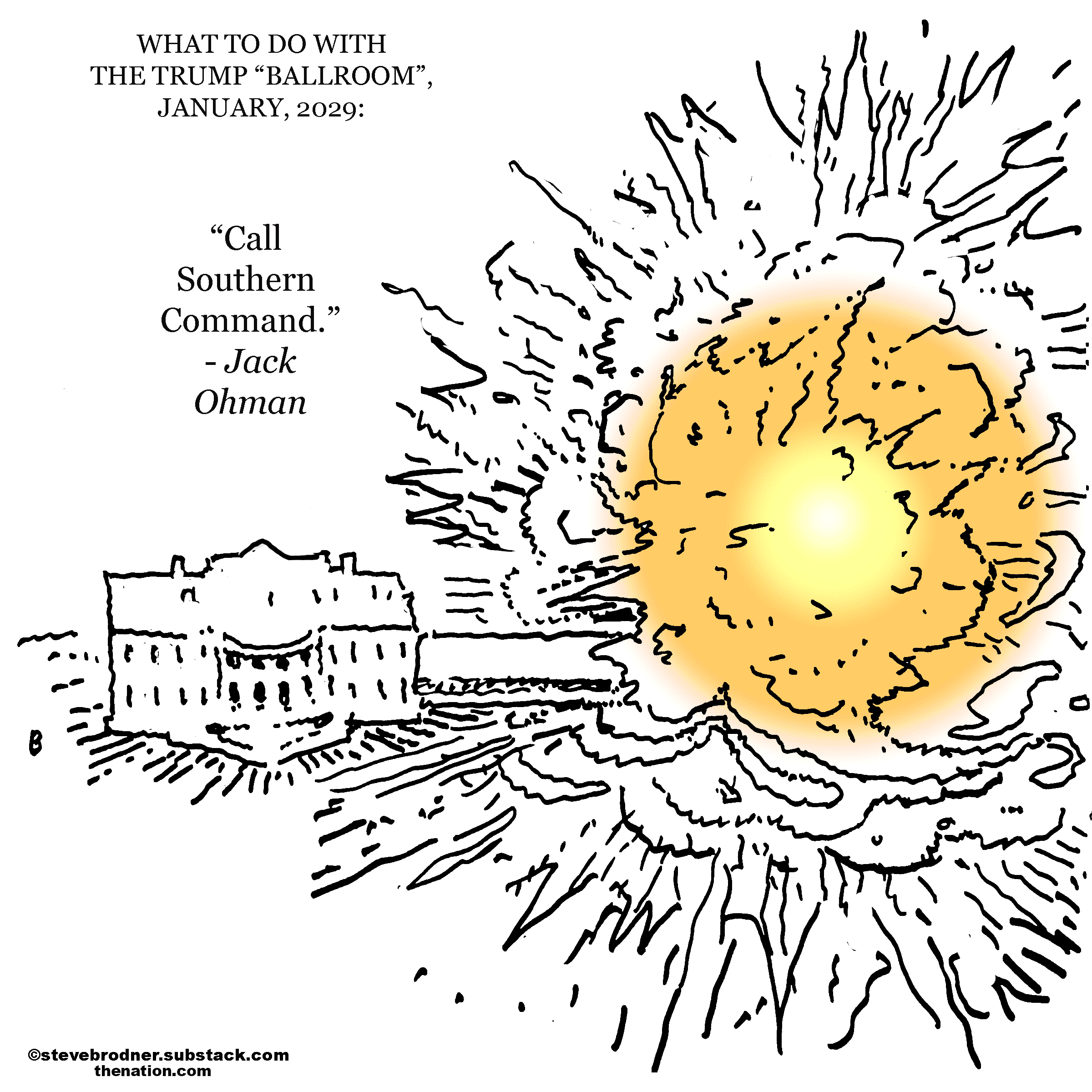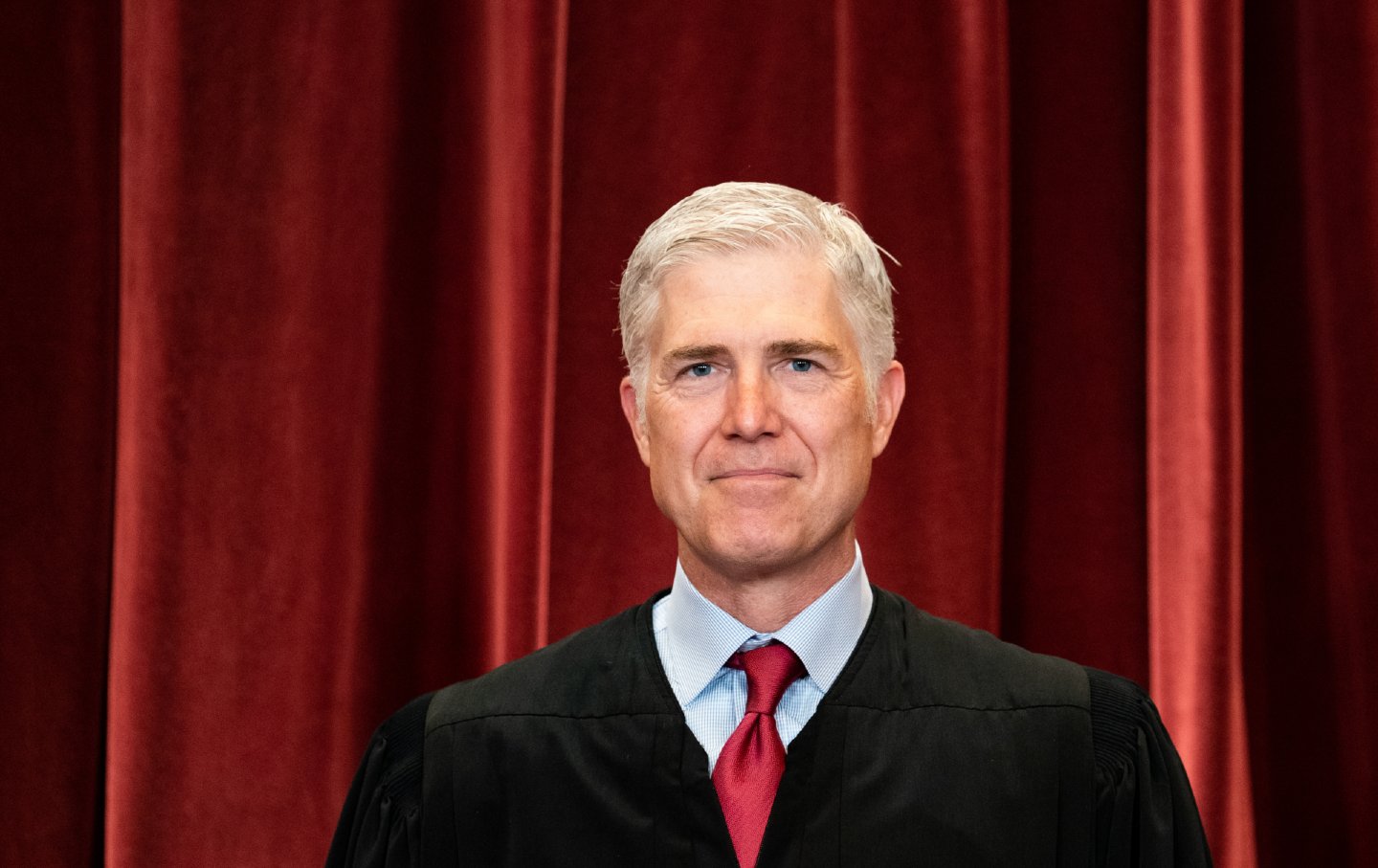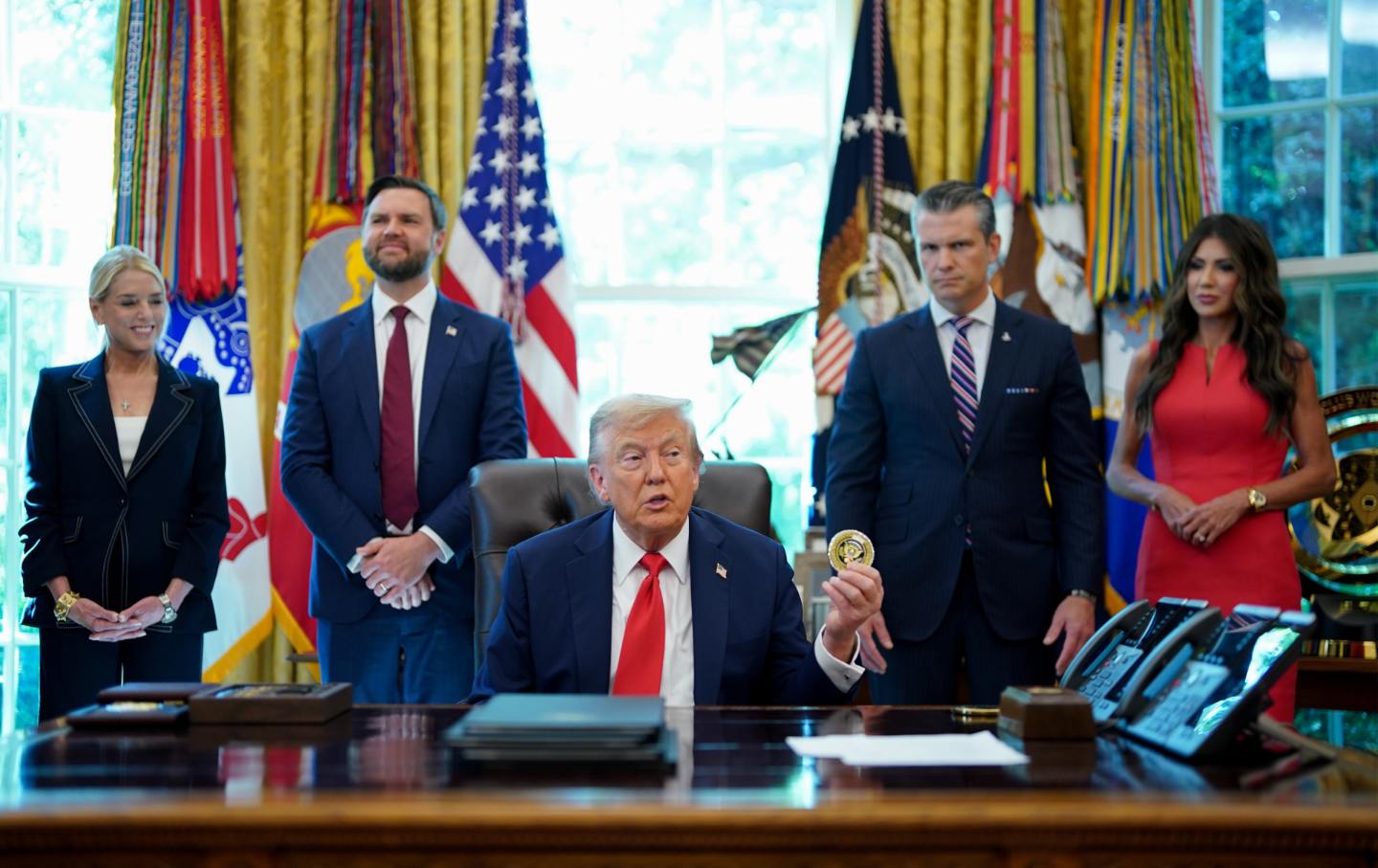The GOP’s Ludicrous Claims of “Election Interference”
If the rule of law has any coherent meaning, it’s that it applies to all citizens—regardless of the power they hold or any aspirations to power they maintain.

Former US president Donald Trump appears in a Manhattan court during his arraignment on April 4, 2023, in New York City.
(Seth Wenig / Pool / Getty Images)Now that Donald Trump has earned his fourth criminal indictment, the MAGA base of the Republican Party has rallied around Trump’s dismissals of the legal charges he’s facing. We hear across the MAGAverse that the prosecutions targeting the former president are simply “election interference”—aimed at derailing Trump’s 2024 reelection bid. Trump defenders from Senator Ted Cruz to Representative Marjorie Taylor Greene all intone the refrain, as Trump himself keeps hammering away at it. And now that court dates are in play for Trump’s federal election-tampering case, the charge of election interference on the right will become a deafening chorus, alongside the dark MAGA vision of Trump’s victimization at the hands of a “weaponized” and ideologically driven “two-tiered justice system.”
On one level, the depiction of the Trump prosecutions as politically choreographed election interference is classic Orwellian doublethink: In both his Washington and Georgia trials, Trump himself is charged with interfering in the 2020 election in order to seize power in the failed January 6 coup attempt. As a legal claim, Trump’s defense doesn’t rise above the “I know you are, but what am I?” logic that resounds through talk-radio hate fests and cable-news hits.
Indeed, weary chroniclers of right-wing legal rhetoric may recall that Senator Mitch McConnell used the photographic negative of such claims—the no-less-spurious contention that a pending election would contaminate the solemn congressional deliberations about the country’s legal future—to deep-six Barack Obama’s nomination of Merrick Garland to the US Supreme Court. (It is, admittedly, difficult to keep this precedent firmly in mind, since McConnell and the Republicans promptly trashed this line of reasoning to streamline Amy Coney Barrett’s Supreme Court nomination just weeks ahead of the 2020 presidential balloting.)
But the opportunism and hypocrisy of the election interference charge are just its surface features, shared in common with a long line of Trumpian catchphrases, from “fake news” to “the deep state.” What’s more telling about the claim is its instrumental view of elections themselves—together with the principal actors who are supposed to be exercising agency in them, the American people. In the wild-swinging rhetoric of electoral corruption on the right, only some elections and actors are conferred legitimacy. According to this backward-reeling account of American democracy, the 74 million Trump voters who turned out in 2020 are always and forever the great injured Real American majority, while the 81 million who cast their ballots for Biden are virtual nonentities—fictions of a cunning deep state.
This account of what constitutes a legitimate election and voting public was instantly exposed as self-serving agitprop in the aftermath of the 2020 balloting, since close congressional and state-level elections that broke for GOP candidates magically didn’t qualify for scrutiny as subject to fraud or voting-machine tampering. The right-wing defenders of an endangered ballot focused only on the main event—the state-by-state rigging of the outcome for Biden and against Trump, down-ballot races be damned.
So when the clarion call of election interference blares forth outside of courthouses and in Rumble podcasts, it’s important to foreground the question: interference for whom? Or perhaps more to the point: elections for whom? The crabbed version of popular sovereignty that Trump and his allies are now flogging really only endorses MAGA outcomes for MAGA candidates.
Amid all the debates over the Trump movement’s adjacency to classical European fascism, here’s an arresting data point: Like all authoritarian leaders, Trump understands the people he seeks to represent only as an enabling prop. When they refuse or fail to serve that function—by voting Democratic or otherwise assisting his opposition—they stand in violation of the MAGA social contract, and no longer are entitled to political agency or self-determination. And instead of looking to the 1930s-era roster of fascist leaders for illustrative precedents, we have one ready in the present Republican Party hall of heroes: Hungarian strongman leader Viktor Orbán.
Like Trump, Orbán professes to represent the blood-and-soil real majority of his country; like Trump, Orbán has cultivated a paramilitary arm of his movement to ensure that the electoral system only operates on a narrow grid of preordained executive outcomes. Like Trump, Orbán has promulgated plans to reconfigure government service and leading civic institutions such as public education in his own preferred ideological image. The only relevant difference, really, is that Orbán remains in office and has successfully remade Hungary’s elections and electorate to produce plebiscites returning him to power by comically implausible vote margins that guarantee his retaining executive power indefinitely. And Orbán has, like his Stateside Trump movement admirers, dismantled the country’s independent judiciary, replacing it with a corps of hard-right jurists to rubber-stamp his governing prerogatives. Small wonder that Orbán, in a recent interview with Tucker Carlson, urged Americans to “call back Trump” so that the hallowed traditions of Western civilization can be saved.
Part of the right’s clamor to place Trump above legal accountability is that the conservative movement has been assiduously building the underlying infrastructure for Orbanist rule, and is loath to see it jeopardized on the eve of its full realization. This rarely noted transformation has taken place in the wake of the Roberts court’s dismantling of the Voting Rights Act in its calamitous 2014 Shelby v. Holder ruling. The aim, as David Daley has written, is to make the electoral process responsive to just one segment of the actually existing electorate:
A Supreme Court of robed ideologues, with a conservative majority nominated by presidents who lost the popular vote and a Senate that lacks national popular legitimacy, answerable to no one, responsive only to Fox News talking points, makes its own rules as it goes along, substituting its judgment for that of Congress. State legislatures no longer resemble democracy in North Carolina, Wisconsin and Ohio, and have been placed beyond the reach of voters in Florida, Texas and Pennsylvania. Upward of 80 percent of state legislative races in Georgia are so hardwired for conservative incumbency that they have recently failed to attract any major-party competitors at all.
This is also the structural rationale behind another glib right-wing line of Trump defense: that it’s improper to have the courts settle the question of Trump’s culpability in the January 6 coup, or his theft of public documents and concealment of them on the grounds of his Mar-a-Lago compound, or, for that matter, his role in arranging a hush-money payoff of his porn-star inamorata Stormy Daniels. These are matters that should be referred to voters in the next election, not entrusted to the machinations of a suspect court system. This was the plaint of reliable Trump toady Lindsey Graham during a recent Fox News appearance, and it’s a favored talking point of CPAC leader Matt Schlapp, as he faces his own set of legal tribulations. (During the GOP presidential debate in Milwaukee, Nikki Haley gestured toward the same nonsolution in a cloud of candidate bromides: “When it comes to whether President Trump should serve or not, I trust the American people.”) Here again, there’s the trademark Trumpist lurch into hypocrisy, as Trump apologists seek to bestow unprecedented legal powers upon election outcomes, while pleading on behalf of a leader who baselessly sought to reverse an election. The effectiveness of such appeals is readily gauged in the nearly three-year aftermath of January 6, as Trump continues to undermine the legitimacy of free and fair balloting with every rally and every interview he conducts and every TruthSocial tantrum he unleashes.
Yet the broader counter-constitutional logic of such appeals is the most important thing to flag here: The elections-first approach to assessing criminal liability is a perversion of the separation of powers. If the rule of law has any coherent meaning in the flailing American republic, it’s that it applies in all conditions to all citizens, regardless of the power they hold or any aspirations to power they maintain. Were things otherwise, on the Graham-Schlapp model of jurisprudence, criminals of any description could hurriedly announce a candidacy for office, so as to let the electorate determine their status as a prospective lawbreaker at a convenient later date.
This demented brand of reasoning also overlooks the obvious consideration that, followed to its logical conclusions, it makes election law all but unenforceable, since candidates for office are, by definition, always the main offenders. Watergate would never have produced a congressional legal inquiry to impeach Richard Nixon if the system had heeded the verdict tendered in Nixon’s historic 1972 reelection landslide. Opinion polls had likewise shown fairly lackluster public interest in the legal upshot of the Watergate scandal right up until Nixon’s resignation. The people had clearly spoken, according to the Graham-Schlapp theory of the case—and wasn’t the timing of Nixon’s resignation suspiciously close to a midterm cycle that the Democrats ran away with?
Such are the ludicrous turns of argument that win the endorsement of a Republican elite that has never had to think of popular sovereignty as anything other than a hastily and selectively invoked means of securing antidemocratic ends. Amid the barrage of Orbanite rhetoric about the courts and the ballot, the non-MAGA public tends to shrug off such bankrupt posturing as the handiwork of a shambolic MAGA priesthood high on its own supply. Meanwhile, most mainstream political outlets uncritically platform it without any intelligible historical or civic context. Yet the delusional accounts of law and justice routinely aired on Trump’s behalf bespeak something even more troubling: the impatience of an autocratic movement that has figured out how to seize power without the constraints of either law or democratic process and is simply waiting for the rest of the country’s decaying civic infrastructure to give way for the final putsch.
Disobey authoritarians, support The Nation
Over the past year you’ve read Nation writers like Elie Mystal, Kaveh Akbar, John Nichols, Joan Walsh, Bryce Covert, Dave Zirin, Jeet Heer, Michael T. Klare, Katha Pollitt, Amy Littlefield, Gregg Gonsalves, and Sasha Abramsky take on the Trump family’s corruption, set the record straight about Robert F. Kennedy Jr.’s catastrophic Make America Healthy Again movement, survey the fallout and human cost of the DOGE wrecking ball, anticipate the Supreme Court’s dangerous antidemocratic rulings, and amplify successful tactics of resistance on the streets and in Congress.
We publish these stories because when members of our communities are being abducted, household debt is climbing, and AI data centers are causing water and electricity shortages, we have a duty as journalists to do all we can to inform the public.
In 2026, our aim is to do more than ever before—but we need your support to make that happen.
Through December 31, a generous donor will match all donations up to $75,000. That means that your contribution will be doubled, dollar for dollar. If we hit the full match, we’ll be starting 2026 with $150,000 to invest in the stories that impact real people’s lives—the kinds of stories that billionaire-owned, corporate-backed outlets aren’t covering.
With your support, our team will publish major stories that the president and his allies won’t want you to read. We’ll cover the emerging military-tech industrial complex and matters of war, peace, and surveillance, as well as the affordability crisis, hunger, housing, healthcare, the environment, attacks on reproductive rights, and much more. At the same time, we’ll imagine alternatives to Trumpian rule and uplift efforts to create a better world, here and now.
While your gift has twice the impact, I’m asking you to support The Nation with a donation today. You’ll empower the journalists, editors, and fact-checkers best equipped to hold this authoritarian administration to account.
I hope you won’t miss this moment—donate to The Nation today.
Onward,
Katrina vanden Heuvel
Editor and publisher, The Nation
More from The Nation


The Supreme Court Has a Serial Killer Problem The Supreme Court Has a Serial Killer Problem
In this week's Elie v. U.S., The Nation’s justice correspondent recaps a major death penalty case that came before the high court as well as the shenanigans of a man who’s angling...

Corporate Democrats Are Foolishly Surrendering the AI Fight Corporate Democrats Are Foolishly Surrendering the AI Fight
Voters want the party to get tough on the industry. But Democratic leaders are following the money instead.

Marching Against a Corrupt Regime Marching Against a Corrupt Regime
People taking to the streets for democracy.

It Would Be Madness to Give Trump and His Toadies Even More Power It Would Be Madness to Give Trump and His Toadies Even More Power
And yet, that’s what the Supreme Court appears prepared to do.

Trump Is Dragging Republicans to Crushing Defeat After Crushing Defeat Trump Is Dragging Republicans to Crushing Defeat After Crushing Defeat
The president is deeply unpopular, his policies are failing, and Republicans are losing—everywhere.


